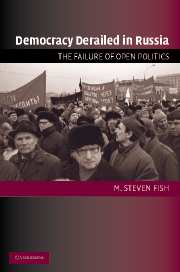Book contents
- Frontmatter
- Contents
- List of Figures and Tables
- Acknowledgments
- Abbreviations
- 1 INTRODUCTION
- 2 SOME CONCEPTS AND THEIR APPLICATION TO RUSSIA
- 3 SYMPTOMS OF THE FAILURE OF DEMOCRACY
- 4 THE RUSSIAN CONDITION IN GLOBAL PERSPECTIVE
- 5 THE STRUCTURAL PROBLEM: GREASE AND GLITTER
- 6 THE POLICY PROBLEM: ECONOMIC STATISM
- 7 THE INSTITUTIONAL PROBLEM: SUPERPRESIDENTIALISM
- 8 CAN DEMOCRACY GET BACK ON TRACK?
- References
- Index
- Titles in the series
1 - INTRODUCTION
Published online by Cambridge University Press: 05 September 2012
- Frontmatter
- Contents
- List of Figures and Tables
- Acknowledgments
- Abbreviations
- 1 INTRODUCTION
- 2 SOME CONCEPTS AND THEIR APPLICATION TO RUSSIA
- 3 SYMPTOMS OF THE FAILURE OF DEMOCRACY
- 4 THE RUSSIAN CONDITION IN GLOBAL PERSPECTIVE
- 5 THE STRUCTURAL PROBLEM: GREASE AND GLITTER
- 6 THE POLICY PROBLEM: ECONOMIC STATISM
- 7 THE INSTITUTIONAL PROBLEM: SUPERPRESIDENTIALISM
- 8 CAN DEMOCRACY GET BACK ON TRACK?
- References
- Index
- Titles in the series
Summary
A decade and a half after the collapse of the Soviet system, Russian democracy lies in tatters. After the spectacular political breakthroughs of the late 1980s and early 1990s, democratization slowly ground to a halt. As the 1990s wore on and the new century dawned, many of the gains of the late Soviet and early post-Soviet periods were in jeopardy. By the time of Vladimir Putin's reelection as president of Russia in 2004, Russia's experiment with open politics was over.
To be sure, Russian citizens live in a more open polity than they did during the Soviet era. They also live a freer political existence than do the inhabitants of some other lands of the former Soviet Union. Russia did undergo substantial democratization. Unlike Uzbekistan and Turkmenistan, Russia did not merely slide from one form of autocratic police state to another. In contrast with Belarus and Kazakhstan, it did not swiftly revert to full-blown dictatorship after a brief opening.
Yet unlike many of its other postcommunist neighbors, Russia failed to advance to democracy. This book seeks to explain why.
The Study and Its Arguments in Context
Russia was the central entity of the Russian Empire and then the Soviet bloc. Its course of political change after the demise of communism could not be dictated by foreign powers or be driven by mechanical emulation of foreign models. Russia had the economic, bureaucratic, military, and cultural resources to make its own choices.
- Type
- Chapter
- Information
- Democracy Derailed in RussiaThe Failure of Open Politics, pp. 1 - 14Publisher: Cambridge University PressPrint publication year: 2005

